Northwestern CS Postdocs and PhD Students Secure Faculty and Industry Positions
Outgoing postdoctoral fellows and PhD alumni from the Northwestern CS Theory Group have secured positions in academia and industry to continue pursuing research and mentorship goals during the next stage of their careers.
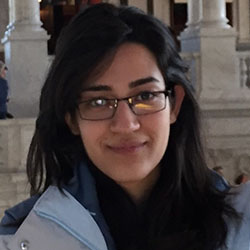 Saba Ahmadi
Saba Ahmadi
PhD adviser: Samir Khuller
Ahmadi is currently a postdoctoral researcher at the Toyota Technological Institute (TTIC), mentored by Avrim Blum, professor and chief academic officer at TTIC and director of the Institute for Data, Econometrics, Algorithms, and Learning (IDEAL).
Ahmadi’s research interests center around the foundations of responsible computing, including learning theory, algorithmic fairness, and combinatorial optimization. She has focused recently on designing learning algorithms with data from strategic or adversarial agents. Ahmadi is a former visiting scholar in computer science at Northwestern Engineering, advised by Samir Khuller, Peter and Adrienne Barris Chair of Computer Science at the McCormick School of Engineering. She earned her PhD in computer science from the University of Maryland, College Park in 2021.
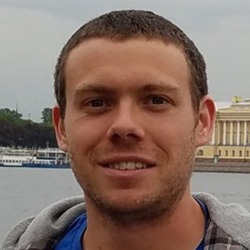 Huck Bennett
Huck Bennett
PhD advisers: Daniel Dadush and Chee Yap (New York University)
Postdoc mentors: Anindya De and Aravindan Vijayaraghavan
Bennett is currently an assistant professor at Oregon State University. His research focuses on theoretical computer science, with an emphasis on lattices and geometric algorithms.
Bennett served as a visiting assisting research scientist at the University of Michigan from 2019 to 2021. Previously, he was a postdoctoral fellow at Northwestern Engineering from 2017 to 2019, mentored by Anindya De, a former assistant professor of computer science at Northwestern Engineering, and Aravindan Vijayaraghavan, associate professor of computer science and (by courtesy) of industrial engineering and management sciences at Northwestern Engineering.
Bennett earned a PhD in computer science from New York University, a master's degree in computer science from the University of Colorado Boulder, and a bachelor's degree in mathematics with a minor in computer science from the University of Wisconsin-Madison.
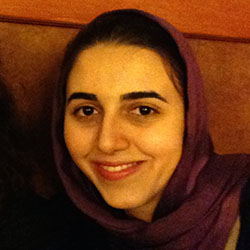 Hedyeh Beyhaghi
Hedyeh Beyhaghi
PhD adviser: Eva Tardos (Cornell University)
Postdoc mentors: Jason Hartline and Samir Khuller (Northwestern) and Avrim Blum (TTIC)
After completing a joint postdoctoral research fellowship at Northwestern Engineering and TTIC — advised by Khuller, Blum, and Jason Hartline, professor of computer science at Northwestern Engineering — Beyhaghi joined the theory group at Carnegie Mellon University as a postdoctoral research associate. Her research interests are algorithmic game theory and mechanism design, machine learning theory, and algorithms under uncertainty.
Beyhaghi obtained a PhD and a master’s degree in computer science from Cornell University, and a bachelor’s degree in computer engineering from the Sharif University of Technology in Tehran, Iran.
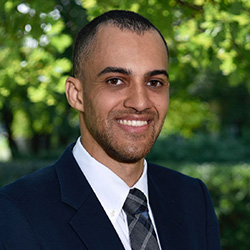 Modibo Camara (PhD ’22)
Modibo Camara (PhD ’22)
PhD advisers: Jason Hartline and Eddie Dekel
Camara, who earned his PhD in economics, was jointly advised by Hartline and Eddie Dekel, William R. Kenan Jr. Professor of Economics at Northwestern’s Weinberg College of Arts and Sciences. Camara is currently a Saieh Family Fellow at the University of Chicago's Becker-Friedman Institute and in July will start a position as assistant professor economics at the Stanford University Graduate School of Business.
Camara leverages methodologies from computer science to understand sources of computational and informational complexity in economic theory. He received the Association for Computing Machinery (ACM) Special Interest Group on Economics and Computation (SIGecom) 2022 Doctoral Dissertation Award for his dissertation, titled “Complexities in Economic Theory.”
Camara said the life skills he gained at Northwestern are “too many to recount,” but emphasized learning how to do academic research and how to communicate technical ideas. He encouraged current students to get started with independent research early.
“It's easier to take on high-risk, high-reward projects early because, even if they don't work out, you'll have time to work on other projects before you graduate,” Camara said. “Think carefully about the limitations of the tools you are using and think creatively about how you might bypass those limitations. It can be helpful to identify fields that struggle with similar problems and study how they managed to (partially) resolve them.”
Camara earned a master’s degree in economics from Northwestern in 2018 and a bachelor’s degree in mathematics and economics from the University of Pennsylvania in 2016.
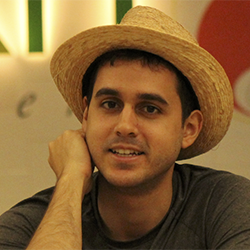 Vaggos (Evangelos) Chatziafratis
Vaggos (Evangelos) Chatziafratis
PhD advisers: Tim Roughgarden and Moses Charikar (Stanford University)
Postdoc mentors: Samir Khuller, Konstantin Makarychev and Aravindan Vijayaraghavan
Chatziafratis was a postdoc at Northwestern CS from 2021 to 2022, mentored by Khuller, Vijayaraghavan, and Konstantin Makarychev, professor of computer science at Northwestern Engineering.
Chatziafratis is currently an assistant professor of computer science and engineering at the University of California, Santa Cruz. Previously, he was a fellow at the Foundations of Data Science Institute. Chatziafratis earned a PhD in computer science at Stanford University in 2021 and a bachelor’s degree in electrical engineering and computer science from the National Technical University of Athens, Greece.
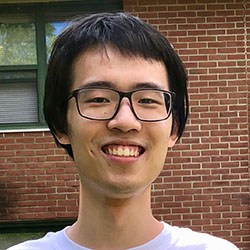 Aidao Chen
Aidao Chen
PhD adviser: Aravindan Vijayaraghavan
Chen, a PhD candidate in computer science at Northwestern Engineering, will join Accutar Biotech, a company applying artificial intelligence technologies to accelerate drug discovery. He earned a master’s degree in computer science from Northwestern Engineering in 2021 and a bachelor’s degree in computer science and technology from Fudan University in Shanghai, China.
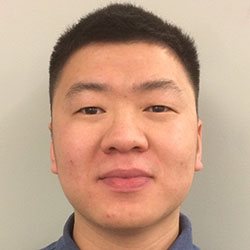 Xue Chen
Xue Chen
PhD adviser: David Zuckerman (University of Texas at Austin)
Postdoc mentors: Konstantin Makarychev and Aravindan Vijayaraghavan
Chen was a postdoctoral associate in computer science at Northwestern Engineering from 2018 to 2020, where he was advised by Makarychev, Vijayaraghavan, and De. He is currently a faculty member in the School of Computer Science and Technology at the University of Science and Technology of China and was previously an assistant professor at George Mason University.
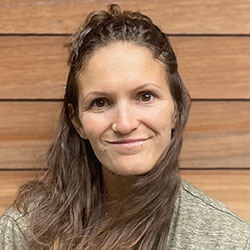 Sami Davies
Sami Davies
PhD adviser: Thomas Rothvoss (University of Washington)
Postdoc mentor: Samir Khuller
Davies, a National Science Foundation Computing Innovation Fellow, will join the University of California, Berkeley, as a research scientist. She designs algorithms for combinatorial optimization problems that go beyond worst-case analysis to develop a more complete theoretical understanding of a problem’s difficulty and provide performance guarantees that are representative of what happens in practice. Davies earned a PhD in math from the University of Washington, a master’s degree from the University Illinois at Chicago, and a bachelor’s degree from Carnegie Mellon University.
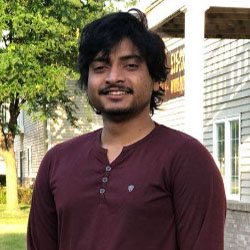 Abhratanu Dutta (PhD ’20)
Abhratanu Dutta (PhD ’20)
PhD adviser: Aravindan Vijayaraghavan
Postdoc mentor: Kristian Hammond
Dutta is currently a postdoctoral scholar with Northwestern’s Center for Advancing Safety of Machine Intelligence (CASMI), a collaboration with the UL Research Institutes' Digital Safety Research Institute directed by Kristian Hammond, Bill and Cathy Osborn Professor of Computer Science at Northwestern Engineering. Previously, Dutta was a research scientist at Meta.
Dutta is broadly interested in algorithms and optimization. His current research revolves around developing new algorithms with provable guarantees for machine learning problems. Dutta earned a bachelor’s degree in computer science and mathematics in 2015 from Chennai Mathematical Institute in Chennai, India.
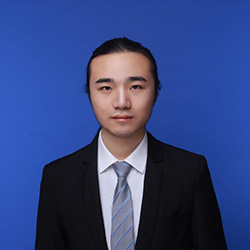 Yiding Feng (PhD ’21)
Yiding Feng (PhD ’21)
PhD adviser: Jason Hartline
Feng earned his PhD in computer science from Northwestern Engineering with a focus on CS + Economics research in mechanism design, online algorithms, and information design under the supervision of Hartline. This month, he is completing a position as a postdoctoral researcher at Microsoft Research Lab – New England (MSR).
In July, Feng will start a one-year position as a principal researcher at the University of Chicago Booth School of Business. He will then join the Hong Kong University of Science and Technology as an assistant professor of industrial engineering and decision analytics.
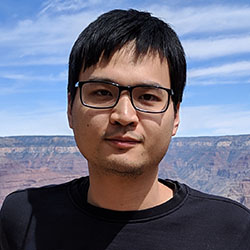 Yingkai Li (PhD ’22)
Yingkai Li (PhD ’22)
PhD adviser: Jason Hartline
Li is currently a postdoc at the Cowles Foundation for Research in Economics at Yale University, where he is working with Dirk Bergemann and Yang Cai. Liu’s research lies at the intersection between computer science and economics, in particular topics related to mechanism design and information design.
Li credits the Northwestern CS PhD program with imparting the life-long skills of identifying good research problems and the ability to collaborate with others. He advises that current graduate students explore different research interests.
“Try different things in early years of study to find out what you are truly passionate about,” Li said.
Li obtained a master’s degree in computer science from Stony Brook University in 2018 and completed a bachelor’s degree from Shanghai Jiaotong University in 2015.
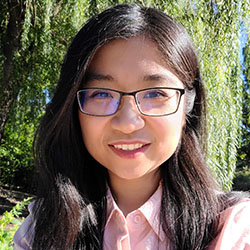 Quanquan Liu
Quanquan Liu
PhD advisers: Julian Shun and Erik Demaine (MIT)
Postdoc mentor: Samir Khuller
Liu will join the Simons Institute for the Theory of Computing at the University of California, Berkeley in the fall as a research fellow, and plans to start a position as an assistant professor at Yale University in January 2024. Her research focuses on designing provably efficient and practical algorithms in both theory and practice for handling big data, in particular for massive modern graphs.
Liu joined Northwestern CS as a postdoc in February 2022 to work with Khuller.
“Samir is a great research match for my research interests, and he is also a wonderful mentor proven by his amazing track record for excellent mentorship,” Liu said. “Northwestern gave me the opportunity to work with a variety of students, both undergrads and grads, and the mentorship skills I learned will be tremendously valuable for my future career.”
Liu advised current PhD students to pace themselves.
“A PhD is a marathon, not a race. Anyone who has done marathon training knows that one doesn't run a 10K on the first day,” Liu said. “Similarly, progress during the PhD is made from consistently chipping away at your problem by reading papers, learning new techniques, and talking to experts.”
Liu earned a PhD in computer science in 2021, a master’s in engineering degree in computer science, and a bachelor’s degree in computer science and mathematics, all from MIT.
 Shravas Rao
Shravas Rao
PhD adviser: Oded Regev (New York University)
Postdoc mentor: Aravindan Vijayaraghavan
After completing a Warren postdoctoral teaching fellowship at Northwestern Engineering, Rao joined the faculty at Portland State University as an assistant professor of computer science in fall 2022.
Rao studies theoretical computer science, with an emphasis on derandomization and pseudorandomness. His recent work relates to restrictions on the slice theorem and the relationship between the slice and the concept of high dimensional expanders.
Rao earned a PhD in computer science from New York University.
 Aravind Reddy (PhD ’23)
Aravind Reddy (PhD ’23)
PhD advisers: Konstantin Makarychev and Aravindan Vijayaraghavan
Reddy, who graduated this month with a PhD in computer science from Northwestern Engineering, will join the Broad Institute of MIT and Harvard as a postdoc in July.
His research interests lie broadly at the intersection of approximation algorithms, theoretical machine learning, and statistics. He has worked on projects related to causal inference, clustering, determinantal point processes, graphical models, and submodular function maximization.
Reddy earned a bachelor of technology degree in computer science and engineering with a minor of physics in 2018 from the Indian Institute of Technology Kanpur.
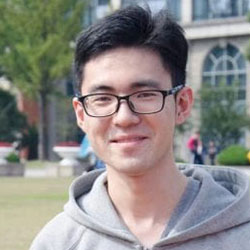 Liren Shan
Liren Shan
PhD adviser: Konstantin Makarychev
Shan, who studies approximation algorithms, graph theory, and algorithmic game theory, will join TTIC as a research assistant professor in August. The aim of his research is to design algorithms for data analysis and decision-making in real-world problems. He is currently focused on clustering and graph partitioning problems.
Shan became interested in theoretical computer science while he was earning a bachelor’s degree in mathematics and applied mathematics from Fudan University.
“Northwestern Computer Science has a strong and active theory group,” Shan said. “The theory group at Northwestern is like a big family with great professors and students. I learned how to find and formulate good research problems from real-world applications, like creating more explainable clustering and modeling the common law system as an online learning algorithm. I also learned how to use and create powerful tools and techniques to solve these problems.”
Shan recommends that current students be active in the community and attend talks and social activities.
“Great research ideas often come from good communication with other researchers,” Shan said.
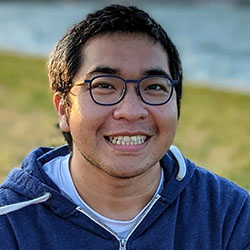 Pattara Sukprasert (PhD ’23)
Pattara Sukprasert (PhD ’23)
PhD adviser: Samir Khuller
Sukprasert graduated in June with a PhD in computer science from Northwestern Engineering. He plans to join Databricks as a software engineer. His research interests center broadly in topics related to graph theory, including graph algorithms, approximation algorithms, dynamic algorithms, online algorithms, clustering, fairness, and stability. His dissertation was titled “Fantastic Subgraphs and How to Find Them.”
Sukprasert earned a master’s degree in computer science from University of Maryland, College Park — advised by Khuller — a master’s degree in computer engineering from Kasetsart University in Bangkok, Thailand, and a bachelor’s degree in computer engineering from Chulalongkorn University in Bangkok.
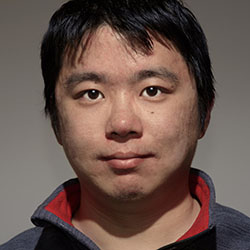 Sheng Yang
Sheng Yang
PhD adviser: Samir Khuller
Postdoc mentor: Samir Khuller
Yang’s research focuses on the well-established scheduling problems as well as emerging variants originating from cloud computing. He is also broadly interested in graph algorithms, discrete optimization, and stochastic optimization. Yang joined the Northwestern CS Theory Group as a postdoctoral fellow in 2021 after earning a PhD from the University of Maryland, College Park, advised by Khuller in 2020. Currently, he is a member of a research lab in Shanghai. Yang received a B.Eng from Tsinghua University, China.
